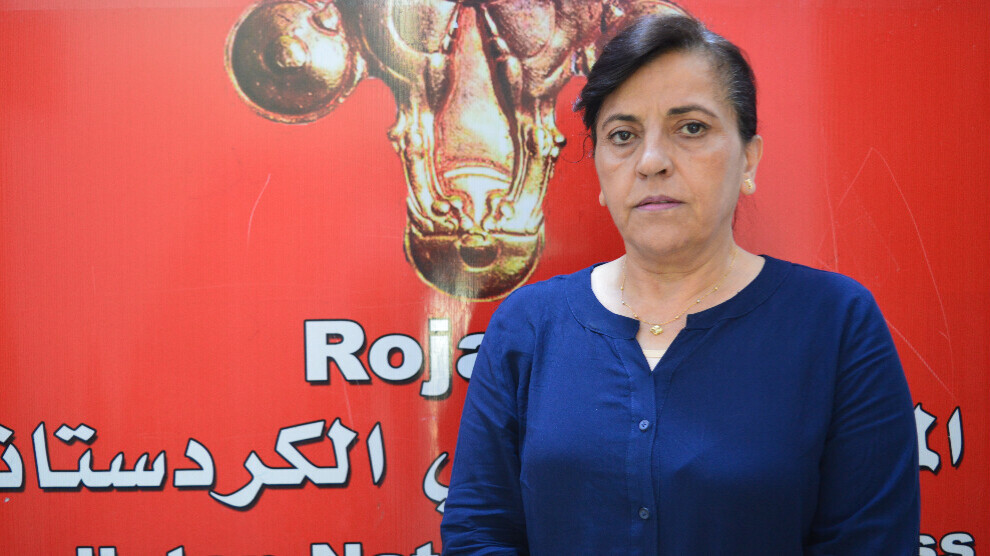‘National unity can ruin all plans against Kurdistan'
Kurdistan National Congress Executive Council member Hêvî Mustafa spoke about the attacks on four parts of Kurdistan and said, “National unity can ruin all plans.”

ROJ HOZAN
Qamishlo- Although Kurdistan has been divided into four parts by international agreements, the Kurds still resist in four parts despite the borders. In an interview with NuJINHA, Kurdistan National Congress (KNK) Executive Council member Hêvî Mustafa spoke about the attacks on four parts of Kurdistan and the resistance of the Kurds against the attacks.
Noting that the sovereign powers always try to create conflict among the Kurdish people, Hêvî Mustafa said, “The sovereign powers have carried out war policies against the Kurds throughout history. While Kurdistan has been divided into four parts, the Kurds have been subjected to massacre, looting, occupation and displacement policies for years. Now we want to overcome these historical mistakes and build the national unity of Kurdistan. The politics of our parties always maintain an unstable party system and cannot develop a common strategy to build a national unity. The enemies have plans about the Kurds; they always try to destroy the achievements of the Kurds everywhere. If the Kurds do not unite and have a common strategy, another Treaty of Lausanne will happen again and the genocide against the Kurds will always continue.”
‘The achievements of the Kurds are at risk’
Emphasizing that the achievements of the Kurds are at risk and all parties must be aware of this, Hêvî Mustafa continued her speech as follows: “All achievements of the Kurds are at risk. Today, Rojava Kurdistan and the Autonomous Administration of North and East Syria are under attack while there are attacks on other parts of Kurdistan. If the achievements of Rojava Kurdistan are destroyed, Southern, Northern and Eastern Kurdistan will also be defeated. The recent attacks on the Makhmour refugee camp and the agreement signed on October 9, 2020 about Shengal (Sinjar) are the results of these conflicts. The enemy has built such a system that it aims to destroy not only a part of Kurdistan, but all parts. The Kurds can have different thoughts and ideology. Although we have some objections, we should not serve the enemy. We should unite and protect our achievements.”
‘They can form their own assemblies’
Noting that the revolution in Rojava raises awareness of the Kurdish people, Hêvî Mustafa said, “The Kurdish people have developed a self-governing system and have formed their own assemblies in this system. Our people want the Kurdish forces and Kurdish administrations to build their own assemblies. As the KNK, we make efforts to look out for the interests of the Kurdish people first. Closing the borders of the four parts of Kurdistan is neither a moral nor a humanitarian stance, especially the borders of Rojava Kurdistan, which is subjected to the attacks of the Turkish state and Syrian regime every day. Closing the border will make the lives of local people very difficult and cause the enemy to intensify its attacks on Kurdistan. We make efforts to prevent this by raising awareness of the Kurdish people.”
‘The achievements of women are at bigger risk’
Mentioning the threats against the achievements of women, she said, “As we mentioned before, there are threats against the achievements of the Kurdish people. But we should remember that the achievements of women are at bigger risk. The achievements of women are under attack. The enemy sees the revolution in Rojava Kurdistan as a threat and it attacks women because women lead the revolution. The enemy wants to destroy the women’s revolution in Rojava. Women oppose the system of slavery and struggle against it. We hope that women will once again lead the Kurdish unity and grow their struggle to achieve this unity. We try to struggle against all agreements signed against Kurdistan. We are determined to form a national unity among the Kurdish people. We have planned some activities and protests on the 100th anniversary of the Treaty of Lausanne to protect the achievements of our people.”
